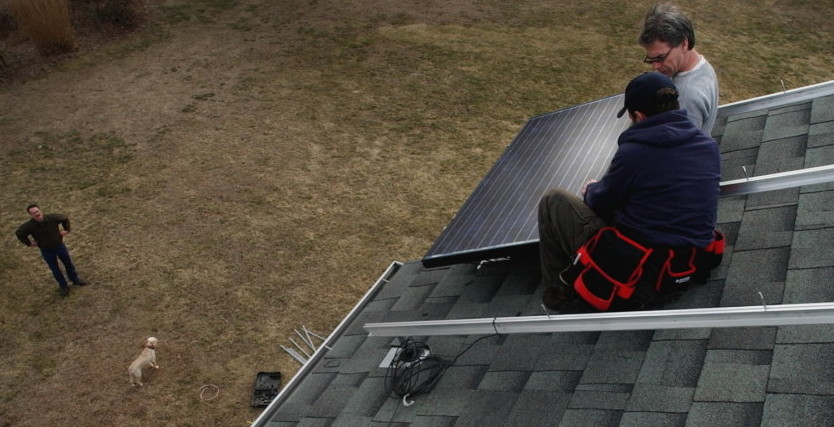HARTFORD, Conn. — Efforts to encourage more residential rooftop solar panels in Connecticut are being slowed by a cumbersome permitting process at the local level, the industry says.
Towns and cities say more rules will cost money.
From these two points of view, legislation emerged that would require towns to approve or deny permits in 30 days and give them 30 days to conduct inspections of new installations. Solar installers say that’s already part of state law, and accuse the municipalities and their allies in the legislature of gutting legislation streamlining permits.
A key complaint among solar panel installers is that permit fees charged by municipalities to homeowners for solar panel installation are excessive.
“The homeowner doesn’t know how they’re being gouged,” said Mike Trahan, executive director of SolarConnecticut Inc., the state’s solar energy business association.
Lawmakers removed a proposed $200 cap on municipal application fees, which Elizabeth Gara, executive director of the Connecticut Council of Small Towns, said could erode municipal revenue.
The average fee is $396, according to Connecticut Green Bank, a quasi-public agency. Fees range from free among towns that waive the cost to as much as $922.
“We’re not looking for a free ride,” Trahan said. “We’re looking for a fee more in line with what work is done.”
Lawmakers scuttled other proposals, he said, citing a requirement that towns establish a checklist of necessary permit documents, post the checklist online, allow contractors to submit permits online or in the mail and shorten the permit review time to 10 days.
A range of incentives such as leases and loans, tax exemptions, federal incentives and other programs are available to Connecticut homeowners and businesses.
As much as 86 megawatts of residential solar energy are operating, approved or in progress, according to Connecticut Green Bank. That’s enough to power nearly 12,000 homes.
In addition, Gov. Dannel P. Malloy has set a goal of 300 megawatts or more of residential solar power by 2022 in a proposal calling on utilities to buy credits produced by residential solar energy systems.
But solar panel installers say navigating a maze of town practices such as different building inspectors’ hours of operation, payment methods, inspections and other procedures are slowing expansion and driving up costs for homeowners.
“There’s no rhyme or reason,” said Pete Debbas, a partner in Skyline Solar, which designs and installs solar panels. “It’s kind of the wild west.”
Rep. Laura Hoydick, R-Stratford, said the industry is seeking “great things and we should get them.” But lawmakers are reluctant to impose more mandates, she said.
The revised legislation allows – rather than requires – towns to move closer to what the industry is seeking, she said.
Nationally, homeowners and businesses can expect to spend an average of six months for applications, inspections, construction and other steps to go solar, said Minh Le, director of the Solar Energy Technologies Office at the Department of Energy.
The federal agency has launched a competition offering $10 million to the best teams that cut “the permit to plug-in time” to seven days for small solar systems or seven weeks for large systems.
“The ultimate challenge is not that one town has a process that takes a long time,” Le said. “The issue is the town next to it that has a very different process.”
Sen. Paul Formica, R-East Lyme, said Connecticut’s patchwork of local governments and agencies has hindered efforts in other areas, such as consolidating emergency dispatch and other services. Streamlining municipal building inspection shouldn’t be difficult, Formica said.
“How much different is it building a deck in Durham or Madison?” he asked.
Send questions/comments to the editors.



Success. Please wait for the page to reload. If the page does not reload within 5 seconds, please refresh the page.
Enter your email and password to access comments.
Hi, to comment on stories you must . This profile is in addition to your subscription and website login.
Already have a commenting profile? .
Invalid username/password.
Please check your email to confirm and complete your registration.
Only subscribers are eligible to post comments. Please subscribe or login first for digital access. Here’s why.
Use the form below to reset your password. When you've submitted your account email, we will send an email with a reset code.